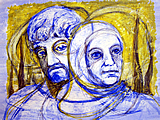
July 2011 Israel Intensive Report
Photo: Watercolor by Jens Brasch


Photo: Watercolor by Jens Brasch
In mid-July an American team of Ann Overton, Allan Cohen, Dan Brownell,
Jens Brasch, Michael Johnston, and Nancy Juda traveled to Israel to offer
the first Developmental Intensive in this region. This course was an important
milestone for us in our work in Israel.
The first Mastery Foundation trip to Israel was nine years ago, after sponsors
of our work in Ireland asked if we could bring our work there to the Middle
East. Thus began several years of inviting Arab and Jewish community leaders
in Israel to participate in the Ireland Intensive and offering community
based programs for organizations and groups in Israel. While it was always
our intention to create an Intensive specifically for this region, we knew
that we needed to wait until we had a sufficient understanding of the culture
and a sufficient foundation of relationships before we could proceed.
Now the time seemed right. For more than a decade, the three-day Intensive in Northern Ireland has produced impressive results. Yet the circumstances and conditions faced by grassroots religious and community leaders in Israel and Palestine are dramatically different. So we committed to begin this year a five-year period during which we will develop an Intensive unique and appropriate to their situation.
We held this first developmental Intensive in Nazareth, an ancient city and the largest Arab city in Israel today. Approximately 65,000 people live in Nazareth, a third of them Christian and two-thirds Muslim. The retreat center is on a hill looking out over this beautiful city sprawling across hills and valleys. It was a total Mastery experience – a Christian retreat center in an Arab city in a Jewish state, embarking on the adventure of providing a transformational experience to participants from the many cultures and circumstances of the region.
The thirty participants in this first developmental Intensive were enrolled by the seven participants in the School for Leadership who live in Israel. Known collectively as Aldiwan, they are Amit Leshem, Irit Gidron, Jamal Daghash, Limor Yehuda, Maha El-Taji Daghash, Mahmud Alamour, and Rula Deeb. This Intensive was an opportunity for them to further their training and development as they near the end of their three years in the School for Leadership. Four of them -- Amit, Limor, Maha, and Jamal -- were apprentice leaders during the program, and three of them -- Irit, Rula, and Mahmud -- were in the participant body, distinguishing what it takes to be a leader and supporting the participants throughout the course.
For most participants, this was their first Mastery Foundation program. They were a diverse group in every way that we look for, identity, age, background, their work in their communities, and residence. Twenty participants were Jewish and 10 Palestinian with two of those living and working in the West Bank. The caliber of the participants and their leadership was noteworthy, and they arrived ready to participate fully. The conversations over the three days were challenging, intellectually rigorous, and open.
Because it was the first time we were delivering an Intensive of this design, the learning curve was just as steep for the program leaders as it was for the participants. Because we knew that developing a new program requires extra effort, we had stipulated that we would be delivering the entire program in English with no translation. Even so, we found ourselves listening more intently than ever and redesigning as we went along.
Our production team provided brilliant support, and for the first time included a local member, Dvora, who was new to our programs. And between jobs, Jens was inspired by the conversations in the course room to produce some of the best drawings he has done for us.
On the final day of the course, each of the participants declared their commitment, their breakthrough, the possibility they are, and the first step they would be taking to fulfill that possibility. They were no longer merely their identity for themselves or each other. It was clear to everyone in the room that the course had delivered a transformational experience and been an extraordinary success. As we said our goodbyes, most participants seemed sad to part and at the same time anxious to get back into their lives and into action with the tools and skills they had gained.
One of the participants, the senior statesmen of the group, wrote to us two weeks later and said:
I should have written much earlier to thank you for the 'Intensive experience' which I found both intensive and truly exceptional at once. But, life as you know – trumps good intentions. So, somewhat belatedly I want you to know that I came back from the workshop feeling very grateful for what you have done and very happy with my decision to become part of the experience.
I am not sure how much you know of Israeli society and how you go about gauging the quality of your participants (whether in Israel or elsewhere). But, however you do it, let me share with you my own assessment of this particular group: in my many years in civil society training all over the world I have not come across a better group than the one you had in Nazareth. If I had to assemble a group for one of my training seminars I doubt that I could have come with that high a percentage of outstanding; (relatively) young; and motivated civic activists as you have. The achievement is all the more impressive coming as it did at a time when Israeli society is undergoing a dramatic and exhilarating outburst of civic energy that rivals the Arab spring and exceeds it in many important ways. Each of the participants can and I think will play a critical role in this movement and some will stand out in it when the time comes.